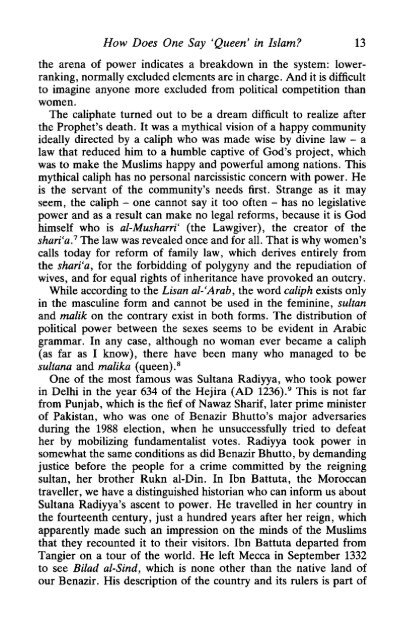Fatima.Mernessi_The-Forgotten-Queens-of-Islam-EN
Fatima.Mernessi_The-Forgotten-Queens-of-Islam-EN
Fatima.Mernessi_The-Forgotten-Queens-of-Islam-EN
You also want an ePaper? Increase the reach of your titles
YUMPU automatically turns print PDFs into web optimized ePapers that Google loves.
How Does One Say 'Queen' in <strong>Islam</strong>? 13<br />
the arena <strong>of</strong> power indicates a breakdown in the system: lowerranking,<br />
normally excluded elements are in charge. And it is difficult<br />
to imagine anyone more excluded from political competition than<br />
women.<br />
<strong>The</strong> caliphate turned out to be a dream difficult to realize after<br />
the Prophet's death. It was a mythical vision <strong>of</strong> a happy community<br />
ideally directed by a caliph who was made wise by divine law - a<br />
law that reduced him to a humble captive <strong>of</strong> God's project, which<br />
was to make the Muslims happy and powerful among nations. This<br />
mythical caliph has no personal narcissistic concern with power. He<br />
is the servant <strong>of</strong> the community's needs first. Strange as it may<br />
seem, the caliph - one cannot say it too <strong>of</strong>ten - has no legislative<br />
power and as a result can make no legal reforms, because it is God<br />
himself who is al-Musharri' (the Lawgiver), the creator <strong>of</strong> the<br />
shari'a. 1 <strong>The</strong> law was revealed once and for all. That is why women's<br />
calls today for reform <strong>of</strong> family law, which derives entirely from<br />
the shari'a, for the forbidding <strong>of</strong> polygyny and the repudiation <strong>of</strong><br />
wives, and for equal rights <strong>of</strong> inheritance have provoked an outcry.<br />
While according to the Lisan al-'Arab, the word caliph exists only<br />
in the masculine form and cannot be used in the feminine, sultan<br />
and malik on the contrary exist in both forms. <strong>The</strong> distribution <strong>of</strong><br />
political power between the sexes seems to be evident in Arabic<br />
grammar. In any case, although no woman ever became a caliph<br />
(as far as I know), there have been many who managed to be<br />
sultana and malika (queen). 8<br />
One <strong>of</strong> the most famous was Sultana Radiyya, who took power<br />
in Delhi in the year 634 <strong>of</strong> the Hejira (AD 1236). 9 This is not far<br />
from Punjab, which is the fief <strong>of</strong> Nawaz Sharif, later prime minister<br />
<strong>of</strong> Pakistan, who was one <strong>of</strong> Benazir Bhutto's major adversaries<br />
during the 1988 election, when he unsuccessfully tried to defeat<br />
her by mobilizing fundamentalist votes. Radiyya took power in<br />
somewhat the same conditions as did Benazir Bhutto, by demanding<br />
justice before the people for a crime committed by the reigning<br />
sultan, her brother Rukn al-Din. In Ibn Battuta, the Moroccan<br />
traveller, we have a distinguished historian who can inform us about<br />
Sultana Radiyya's ascent to power. He travelled in her country in<br />
the fourteenth century, just a hundred years after her reign, which<br />
apparently made such an impression on the minds <strong>of</strong> the Muslims<br />
that they recounted it to their visitors. Ibn Battuta departed from<br />
Tangier on a tour <strong>of</strong> the world. He left Mecca in September 1332<br />
to see Bilad al-Sind, which is none other than the native land <strong>of</strong><br />
our Benazir. His description <strong>of</strong> the country and its rulers is part <strong>of</strong>


